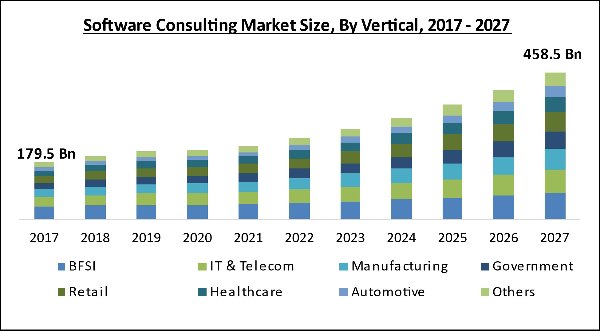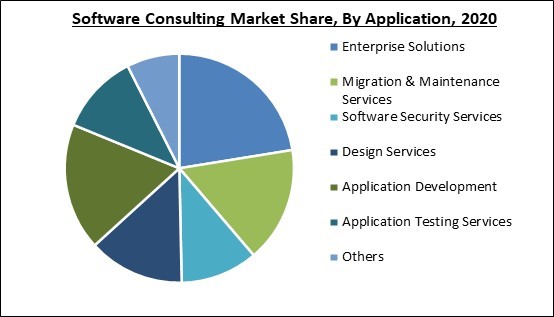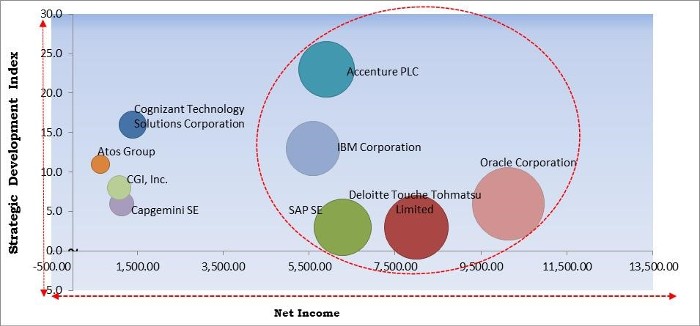The Global Software Consulting Market size is expected to reach $458.5 billion by 2027, rising at a market growth of 12.1% CAGR during the forecast period.
Software consulting is the practice of advising on the best software solutions for a company's business strategy. Different software solutions are being sought by businesses in order to align their technology investments. A software consultant is employed as a contractor for a certain amount of time in the software consulting process. Software consulting firms assist businesses in optimizing, designing, processing, architecting, and implementing software. Furthermore, these services assist businesses in making decisions about software technology and their software adoption investment plan. It also enables businesses to have a clear strategy for technology advancement and to come up with innovative ways to streamline corporate procedures.
Technical skills for improving and maintaining software, onsite management services, support & testing services, and system designing and planning services are all provided by software consulting organizations. Software consulting is the process of finding a software solution to optimize a company's operations while saving time.
Software consultants are familiar with the business domain and model. They advise businesses on software solutions that are vital for their technical progress and can add value to their organization through new solutions, enhanced IT architecture, or better integration between current solutions based on this knowledge. For technology updates, businesses are turning to third-party service providers. The service providers examine a company's software's technical advancements.
Many businesses rely on software consulting services to stay afloat in today's fast-paced technology environment. The market is likely to be driven by increasing digitization in corporate operations. Offshoring and globalization are also likely to boost consulting services demand. Enterprises are projected to adopt new technologies like cloud computing and mobile computing, resulting in an increase in the need for consulting services. The expansion in the number of small and medium businesses, as well as the need for more advanced software solutions, is likely to open up new market prospects for building successful software consulting business models.

The market is rising because to a growing demand for digitization of business processes throughout sectors and verticals, particularly for the smooth integration of software into an enterprise's IT system. However, as a result of the Covid-19 epidemic and the global economic slump, various sectors are experiencing substantial consequences and problems across crucial operations.
While the industry has grown significantly in recent years as a result of digitization and technological penetration, the pandemic has forced numerous nations to the brink of recession. As a result, a large number of consulting customers are deferring projects, lowering project scope to save money, or cancelling them entirely. Multiple client projects that were cancelled have had a negative impact on vendor revenues and have hampered market growth in the short term.
Businesses are apprehensive about the expenses of data hosting on-premises, both in terms of deployment and maintenance. Furthermore, employee costs and challenges with downtime are two additional worries for businesses. The current competitive environment and global economic conditions have hastened the use of cost-effective business model restructuring strategies. Another reason driving the use of cloud computing services is the rising movement of businesses toward digital transformation and the acceleration of customer experience, both of which are lowering corporate expenses. Furthermore, the cloud provides the pay-as-you-go approach, which allows businesses to pay for cloud services based on how often they use them, resulting in lower prices.
While some IT positions were affected during the epidemic, most IT employees have found it relatively simple to obtain new jobs because to the current skills need. Because IT leaders are aware of the scarcity of talent, they are deliberating carefully before cutting roles. Their organisations, on the other hand, require the correct combination of abilities at any given time, which is a shifting objective.
Enterprises with current infrastructure are migrating toward cloud computing services and are prepared to use a hybrid strategy in order to gain the benefits of both on-premises and cloud services. Furthermore, SMEs are significantly considering cloud computing services which is leading to significant benefits such as no upfront infrastructure expenses and compute resources that are available on demand. These variables are influencing the adoption of hybrid cloud services by businesses. Furthermore, the hybrid cloud provides improved workload management, higher security and compliance, and seamless interaction within DevOps teams.
Businesses are turning to the hybrid cloud approach to solve problems that are tough to solve with legacy systems. Hybrid cloud bridges the gap between IT and companies by increasing agility and efficiency while also delivering IT resources quickly and at a reasonable cost. It allows businesses to scale up or down existing applications and infrastructure as needed, while also providing users with high-speed performance and high dependability.
Rather than taking a one-size-fits-all strategy, an increasing number of companies are splitting down big consulting contracts into smaller parts and enlisting the help of many vendors to complete tasks. Because consulting companies do not always have competence in every practise area, healthcare organisations are gradually embracing the multi-sourcing approach.
Healthcare providers, payers, and government agencies are all pushing for numerous consulting companies to work together on projects. Multi-sourcing, on the other hand, may have its own set of challenges and issues since it necessitates effective and reliable service integration amongst vendors. This might have a detrimental influence on consultancy businesses' profitability.

Based on Enterprise Size, the market is segmented into Large Enterprises and Small & Medium Enterprises (SMEs). Over the projected period, the small and medium enterprises category is predicted to grow at the fastest rate. The category is expected to rise as a result of increased activities by different authorities through digital SME campaigns. With the developments in SaaS products, SMEs may now employ low-cost software to compete with bigger enterprises on a level playing field. Over the projected period, these factors are likely to drive demand for software consulting services among small and medium businesses.
Based on Vertical, the market is segmented into BFSI, IT & Telecom, Manufacturing, Government, Retail, Healthcare, Automotive, and Others. In 2020, the BFSI segment held the largest market share. Increased technical innovations in the healthcare industry, including as the Internet of Things (IoT) and wearable, product engineering services, cloud services, data science and business intelligence solutions and integration services are likely to propel the category forward. Furthermore, healthcare providers are likely to increase their need for software consulting services as a result of obligatory government rules and standards for quality and other compliances.
Based on Application, the market is segmented into Enterprise Solutions, Migration & Maintenance Services, Software Security Services, Design Services, Application Development, Application Testing Services, and Others. Over the projected period, the software security services category is expected to develop at the fastest rate. The rising usage of cloud servers to store information, as well as an increase in the number of cyber-attacks to get access to information can be attributed to the expansion of this category. Furthermore, as e-commerce, cloud computing and social networking become more popular throughout the world, the demand for enormous amounts of data to be stored on the cloud with increased security is growing.
| Report Attribute | Details |
|---|---|
| Market size value in 2020 | USD 217.5 Billion |
| Market size forecast in 2027 | USD 458.5 Billion |
| Base Year | 2020 |
| Historical Period | 2017 to 2019 |
| Forecast Period | 2021 to 2027 |
| Revenue Growth Rate | CAGR of 12.1% from 2021 to 2027 |
| Number of Pages | 292 |
| Number of Tables | 431 |
| Report coverage | Market Trends, Revenue Estimation and Forecast, Segmentation Analysis, Regional and Country Breakdown, Competitive Landscape, Companies Strategic Developments, Company Profiling |
| Segments covered | Enterprise Size, Vertical, Application, Region |
| Country scope | US, Canada, Mexico, Germany, UK, France, Russia, Spain, Italy, China, Japan, India, South Korea, Singapore, Malaysia, Brazil, Argentina, UAE, Saudi Arabia, South Africa, Nigeria |
| Growth Drivers |
|
| Restraints |
|
Based on Regions, the market is segmented into North America, Europe, Asia Pacific, and Latin America, Middle East & Africa. From 2021 to 2027, the market in Asia Pacific is predicted to grow at the quickest rate. Various governments in the region are pushing software businesses to create and build FOSS for SaaS, mobile apps, and Service-Oriented Architecture (SOA) (SOA). The usage of software consulting services is likely to increase as a result of such activities. In addition, the region's burgeoning e-commerce industry is driving up demand for site design and mobile app design advice to help online firms. This, in turn, is likely to boost the regional market's growth prospects.
Free Valuable Insights: Global Software Consulting Market size to reach USD 458.5 Billion by 2027

The major strategies followed by the market participants are Acquisitions. Based on the Analysis presented in the Cardinal matrix; Oracle Corporation and Accenture PLC are the forerunners in the Software Consulting Market. Companies such as Atos Group, Capgemini SE, CGI, Inc. are some of the key innovators in the Market.
The market research report covers the analysis of key stake holders of the market. Key companies profiled in the report include Ernst & Young Global Limited, Accenture PLC, Cognizant Technology Solutions Corporation, Deloitte Touche Tohmatsu Limited, IBM Corporation, Atos Group, Capgemini SE, Oracle Corporation, SAP SE, and CGI, Inc.
By Enterprise Size
By Vertical
By Application
By Geography
The global software consulting market size is expected to reach $458.5 billion by 2027.
Lower infrastructure and storage costs result in a higher return on investment are driving the market in coming years, however, a growing array of multi-sourcing strategies are being used limited the growth of the market.
Ernst & Young Global Limited, Accenture PLC, Cognizant Technology Solutions Corporation, Deloitte Touche Tohmatsu Limited, IBM Corporation, Atos Group, Capgemini SE, Oracle Corporation, SAP SE, and CGI, Inc.
The Enterprise Solutions segment has acquired maximum market share the Global Software Consulting Market by Application 2020, thereby, achieving a market value of $95.1 billion by 2027.
The North America is fastest growing region in the Global Software Consulting Market by Region 2020, thereby, achieving a market value of $154.3 billion by 2027.
Our team of dedicated experts can provide you with attractive expansion opportunities for your business.

